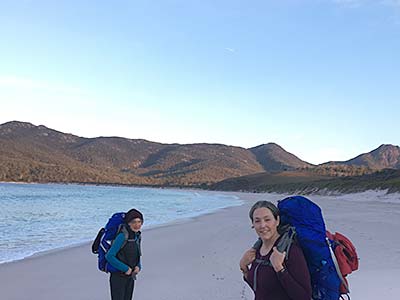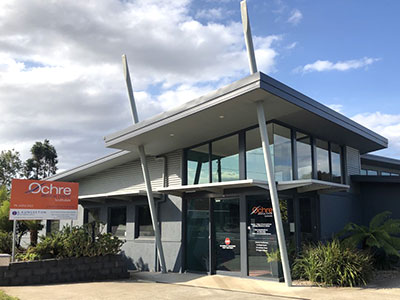Career + Lifestyle: Tasmania in Focus Part 3
In our latest Tasmanian career and lifestyle blog, we talk to Dr. Natalie Burch, Rural Generalist, Medical Educator at Ochre Medical Centre Scottsdale, and inaugural recipient of the Tasmania Rural Doctor of the Year Award (RDAT). Natalie talks to us about why she fell in love with rural medicine and what she loves most about calling the Apple Isle home.
The North East of Tasmania is world-renowned for its charming villages, art galleries, wineries, and flower farms, not to mention its golf courses, mountain bike trails, and walking tracks. And the small town of Springfield, only an hour northeast of Launceston, is where Ochre GP Dr. Natalie Burch calls home. With a property of 50 acres, including a resident platypus and waddling echidnas, WA-born Natalie can’t imagine living anywhere else.
“Life in Tasmania is just so laid back and easy. We live in such a beautiful country area with the vibrant city of Launceston close by,” she says.
“There’s a warm community to be involved in, but it’s not too intrusive. And it’s a great place to further your career and bring up children. Almost every day for 20 years, I've driven 12 kilometres to work through these rolling hills, and every day I just think it's so pretty.”
Natalie fell in love with rural medicine as a rural bonded scholar travelling and working around QLD. “When I finished my fellowship in RACGP, I agreed with my husband that it was his turn to choose where we should live. And he chose Tasmania. I thought, “Oh me and my big mouth" because I hate the cold! But we made the move and honestly haven’t looked back.”

Natalie Burch backpacking in Freycinet
For Natalie, it’s the variety of clinical work in rural Tasmania she loves the most. “Rural GPs talk about this concept of birth to death, and here in Tasmania, we really do birth to death. We deliver babies, and we palliate people, and we do absolutely everything in between. I tried an urban job for about three months and it just was so limited. I couldn't even give someone an iron infusion. So being able to do a bit of everything is what I love,” she explains.
“Not only that, in the cities, the doctor-patient relationship can be very formal with an unrealistic expectation of perfection. But country people just get it. If things go wrong and everyone's done their absolute best, they understand,” she adds.

Ochre Medical Centre Scottsdale
In January 2021, Natalie started a full-time medical educator role at Ochre Health Scottsdale, a position she’s been working towards gradually for most of her career.
“I've unofficially become a medical educator over the last 20 years. As I became more senior, it became natural for me to take on a teaching role. I completed six years as a medical educator with our Rural Vocational Training Scheme, which caters for rural and remote doctors who have supervisors that are off-site. I created programs such as online learning modules and face-to-face workshops for emergency skills - all sorts of stuff,” she says.
“When I was working part-time here at Ochre I never stopped. I’ve always had students, and I'm now a medical educator at Launceston General Hospital. We've got so many junior doctors and registrars this year that I no longer see my patients. I'm still the medical lead at the medical centre, which means I look after the practice manager and make sure things are running smoothly.”
Natalie’s love of learning is ongoing. She’s currently completing a Master's in Health Professional Education at the University of Glasgow, partly funded by HR+, which supports further education training for rural doctors. In her spare time, Natalie also belongs to an orchestra in Launceston where she plays the violin.
“I picked up the violin in my 20s and if I had any advice for doctors who are perhaps getting a little tired of medicine, it would be to learn something completely new and weird like the violin. It helps your brain refocus in every other part of your life as well.”
So what advice would Natalie give to doctors who are considering the move from the mainland to Tasmania?
“I guess it depends on why. If you’re a junior doctor thinking about rural medicine, stay in a hospital and get as much practical experience as you can. It's a mistake to leave too early because all your grounding and skills come from your hospital experiences. And you can't replace this. If you miss acquiring practical knowledge in your foundation years, you're probably never going to fill the gaps.
“One of our current locums, Dr. Paul de Jong, was my mentor when I was an RMO. My year in Gladstone in 1996 was one of my most powerful in terms of getting my feet under me as a rural doctor because I did everything. We just were a small regional hospital, and we did absolutely everything.
“For senior doctors, it depends why you’re coming and what you want out of Tasmania. The beauty is you can be close to a city and still practice rural medicine if you want to. And don’t be concerned or put off if you haven’t done any emergency procedures for a while. All on-call work is backed up with a nominated doctor at the end of the phone who will also come and help if things get hairy.”
A big thank you to Nat for sharing her thoughts and insights with us.
-
Ochre Health has 12 practices across Tasmania, all with well-supported teams working together to make the most of living in and serving their communities. So if you are a GP considering a permanent move, we can certainly help.
Alternatively, if you’d like to get a taste for Tassie, you may want to try a locum work in a variety of locations? With metropolitan centres, the wild west, granite and white sand beach of the east, rural farming communities, and the splendor of King and Flinders Islands, there’s just so many wonderful places to discover.
Click here for more information about our Ochre Health Practices




